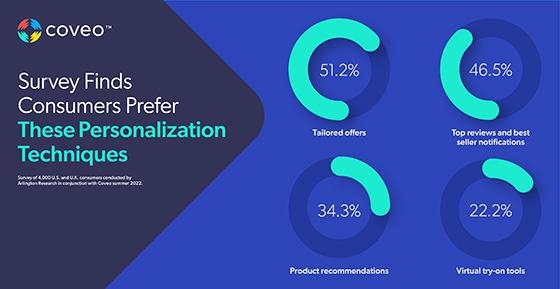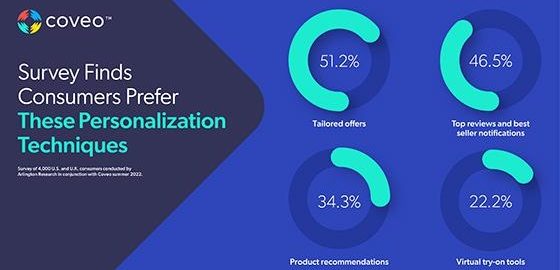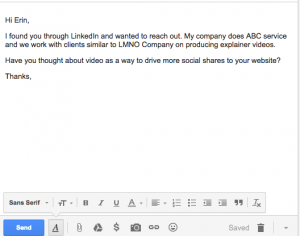Website Personalization Required, But Retail Struggling To Make It Work

Heading into this year’s online holiday shopping season, 55% of the 4,000 U.S. and U.K. consumers who responded to a survey cite poor fit as the top reason for returns when buying online, followed by unmet product expectations and bad quality.
Coveo released a report Thursday that shares insights into retail shopping trends that impact purchase decisions.
Personalization leads consumers to buy and website bounce rates rise when consumers cannot find what they need, according to the 2022 Holiday Shopping Report: Habits, Trends, and Motivators, fielded in summer 2022 and conducted in part by Arlington Research.
“Lack of hyper-personalization, or 1:1 personalization, is causing people to leave a website without purchasing in increasing numbers,” Brian McGlynn, general manager of commerce at Coveo, explained in an email to Search & Performance Marketing Daily.
Some 68% of consumers will not make a purchase if they can’t find the exact products they are looking for on a website, while 51% will leave a brand’s site due to poor website navigation.
A limited number of product reviews — or none at all — will lead 36% of visitors to abandon the online store, while 32% of respondents cite the the same reaction for a poor mobile shopping experience.
“True personalization is the critical component for digital shopping, customers are demanding it and retailers are struggling to make it work,” he wrote.
It’s a bit tricky when it comes to personalization, the study concludes — because it can mean anything from adding search bars to recommendations to reviews to trending topics. It also could mean what others have found useful.
When it comes to personalization, 51.2% want custom offers; 46.5% want top reviews and best seller notifications; 34.3% want product recommendations; and 22.2% want virtual try-on tools that guide fit, style, color, and sizing.
One key motivator for Gen Z consumers ages 18 to 24 is whether a brand’s mission aligns with their values — especially when it comes to sustainability. This group also is most likely to shop with luxury brands online. While 15% of shoppers overall said they want to shop for luxury products online, 28% of Gen Z shoppers said they will purchase luxury goods online.
McGlynn believes sustainability has been exacerbated by the continued push in the overall economy and the continued focus on geological and geopolitical events. Shoppers in these groups — Gen Z, 64%, and Millennials 57% — are most interested in sustainable products, but sustainability plays a role in shopping decisions for 52% of all consumers.
Some 43% of consumers believe sustainability is a bonus from brands they love. For retailers and technologists, this is important to consider when designing the customer experience on a website.
“We’ve had many customers ask about using sustainability scores as a weighting factor in our AI algorithms,” he said.
(12)
Report Post







